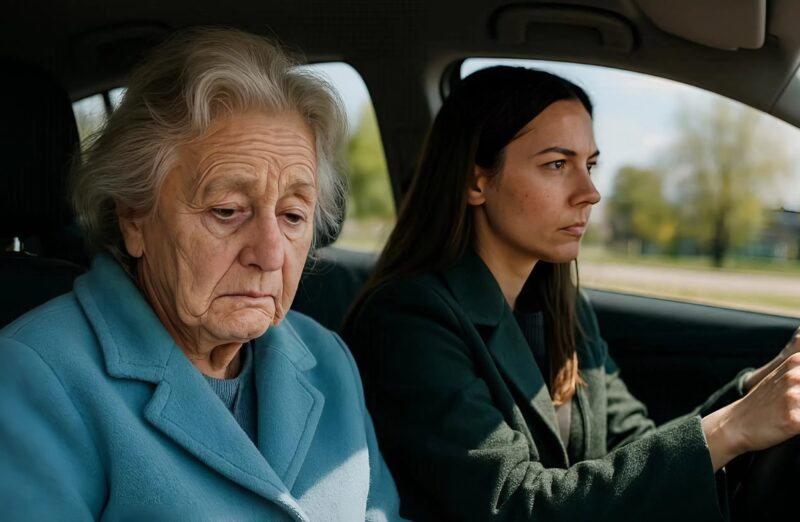When my husband passed away, his daughter was only five. I wasn’t her biological mother, but from that day forward she became mine in every way that mattered.
I tucked her in when nightmares woke her, learned to braid her hair, sat beside her at the kitchen table while she struggled through multiplication tables. Later, I filled out college applications with her, biting my lip as though I were the one waiting for the acceptance letter. I clapped the loudest at her graduation.
I thought we had built something unbreakable.
Now, she is thirty. A confident woman with her own life. And yet, over the last few months, something shifted. She came home late, avoided my eyes, spoke with the clipped efficiency of someone hiding their thoughts. The warmth that had once lit every corner of our little house dimmed.
I began to wonder: was she tired of me? Had my presence become a burden?
One evening, as I folded laundry in the quiet living room, she appeared in the doorway.
“Pack your things,” she said. “Just the essentials. We’re leaving tonight.”
I froze, clutching one of her childhood T-shirts—faded, worn, impossible to throw away.
“Where are we going?” My voice cracked, and my heart hammered with a fear I hadn’t known since the day my husband died.
She didn’t answer.
I followed her instructions silently. We loaded two suitcases into the car. The night pressed heavy against the windows as she drove, her hands steady on the wheel, her face unreadable.
Tears slid down my cheeks. The thought gnawed at me: after all these years of care, love, sacrifice—was she taking me to a nursing home? A place to be stored away, forgotten?
I whispered so softly I wasn’t sure she heard: “Did I do something wrong?”
Her fingers tightened on the steering wheel. “No, Mom. You did everything right.”
That word—Mom—still carried warmth, but it didn’t ease the dread that coiled inside me.
For an hour we drove through unfamiliar streets. My chest ached with every turn. Then, suddenly, she pulled into a narrow lane lined with fairy lights strung between trees. The road opened into a quiet property, a small cottage standing proud beneath a canopy of oaks.
She turned off the engine. “We’re here.”
Confused, I stepped out. The air smelled of jasmine and rain-soaked earth. A porch light glowed, warm and welcoming.
“What is this place?” I asked, voice trembling.
She smiled—truly smiled for the first time in months. “It’s ours.”
I blinked. “Ours?”
She led me up the wooden steps. Inside, the cottage was furnished simply but beautifully. A kitchen with polished counters, a living room with sunlit windows, two bedrooms already prepared. On the table lay a stack of documents with my name and hers side by side.
“I bought this house,” she said. “For us.”
I covered my mouth. “But why—why all the secrecy? Why didn’t you tell me?”
“Because I wanted it to be a surprise.” Her eyes softened, though her voice quivered. “I saw how unhappy you were in the old house. It held too many ghosts of Dad. I thought… maybe a fresh start would help us both.”
The dam of my fear burst, replaced by astonishment. “All this time I thought—” My voice broke. “I thought you were sending me away.”
Her face crumpled. “Sending you away? Mom, no. I’ve been working extra hours, saving every penny, meeting with realtors. That’s why I seemed distant. Not because I don’t love you, but because I wanted to give you something better. A place where we could breathe.”
Tears blurred my vision. I reached for her hands. “You gave me the greatest gift already. You gave me the chance to be your mother.”
She pressed her forehead to mine. “And you gave me a family when I could have lost everything. This house is just a thank-you. A promise that I’ll never abandon you.”
We stood there, surrounded by quiet and the smell of fresh paint and hope.
The weeks that followed were like stepping into a new life. The mornings were filled with bird song instead of traffic. We planted flowers by the porch, laughing when our hands became stained with soil. She set up a small office for her remote job; I claimed the sunroom as a reading nook.
One afternoon, as we unpacked boxes, I found the faded T-shirt I had clutched the night she told me to pack. She picked it up, smiled wistfully, and said, “You kept everything.”
“Of course,” I replied. “Every scrap of your childhood is a piece of my heart.”
She looked at me with such intensity that for a moment I saw the little girl she once was—the one who had run to me after nightmares, who had clung to my hand on her first day of school.
“Mom,” she said, her voice firm, “I promise you’ll never go to a nursing home. Not unless you want to. I’ll be here, always.”
And in that moment, I realized how wrong I had been to doubt. She wasn’t pulling away. She was building toward something.
Months later, as summer wrapped the cottage in golden light, I sat on the porch while she painted the shutters. Neighbors strolled by, waving. I felt a warmth inside me that I hadn’t known in years.
For so long, I thought love meant me caring for her. But now I understood: it meant allowing her to care for me, too.
When she climbed down from the ladder, flecks of paint on her cheek, she laughed. “We make a good team, don’t we?”
“Yes,” I said, smiling. “We always have.”
The fear of that car ride still haunted me sometimes, like a shadow. But every time I looked at the cottage, at the life she had built for us, the shadow faded.
Because my daughter hadn’t taken me to a nursing home.
She had taken me home.
